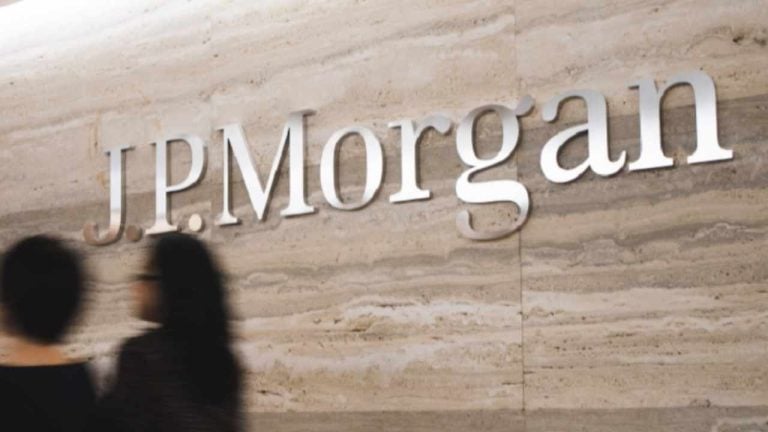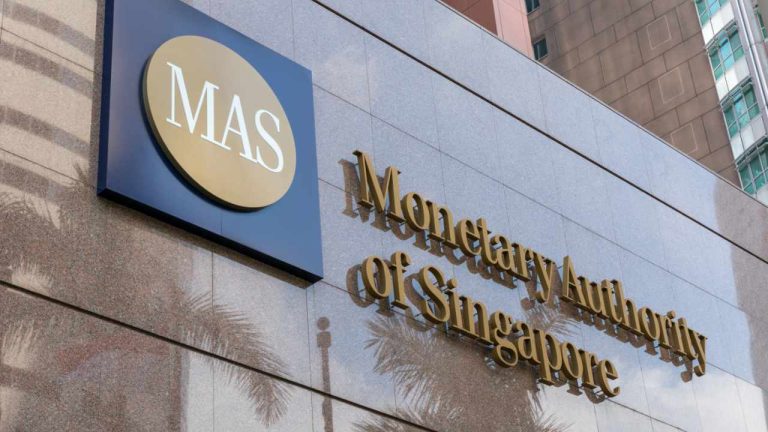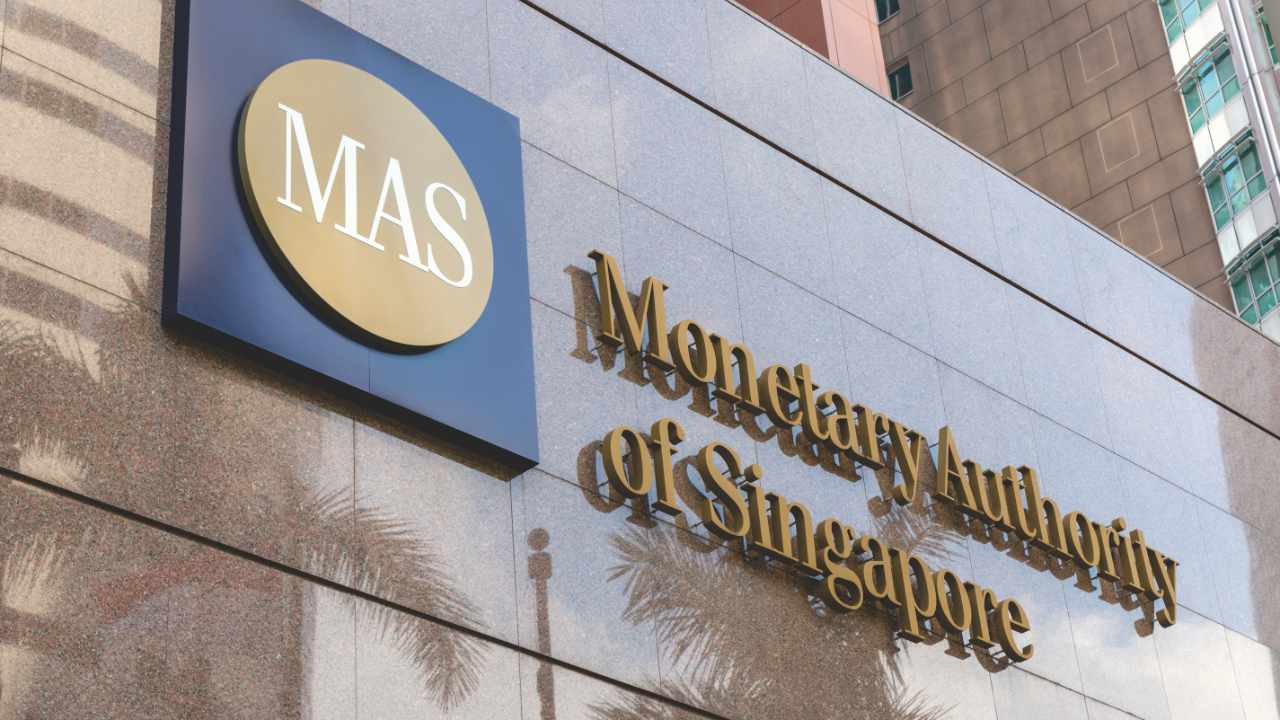 JPMorgan, DBS Bank, and SBI Digital Asset Holdings have completed their first lives trades on a public blockchain using decentralized finance (defi), tokenized deposits, and verifiable credentials under the supervision of the Monetary Authority of Singapore (MAS). Singapore’s central bank is planning two more pilots that involve Standard Chartered Bank, HSBC, and UOB. JPMorgan, DBS […]
JPMorgan, DBS Bank, and SBI Digital Asset Holdings have completed their first lives trades on a public blockchain using decentralized finance (defi), tokenized deposits, and verifiable credentials under the supervision of the Monetary Authority of Singapore (MAS). Singapore’s central bank is planning two more pilots that involve Standard Chartered Bank, HSBC, and UOB. JPMorgan, DBS […]
The approvals came after the Monetary Authority of Singapore issued two consultation papers that proposed to ease regulatory hurdles for digital asset service providers.
Stablecoin issuers Circle and Paxos have each received approvals for their respective licenses from the Monetary Authority of Singapore (MAS), the city-state's central bank.
Circle received in-principle approval for a Major Payments Institution License allowing it to issue cryptocurrencies and facilitate domestic and cross-border payments while Paxos received its license to offer digital payment token services.
Circle and Paxos both announced their approvals on Nov. 2, which came a week after the MAS issued two consultation papers on proposals for regulating digital payment token service providers and stablecoin issuers under Singapore’s Payment Services Act (PSA).
The PSA was passed by the Singapore Parliament in 2019, which purports to regulate payment systems and authorizes MAS to oversee the conduct of payment service providers.
Circle, the issuer behind USD Coin (UDSC), and Paxos with its Pax Dollar (USDP), both U.S. dollar-pegged stablecoins will now be able to offer their respective stablecoins and other digital payment token products within Singapore.
According to Dante Disparte, Circle's Chief Strategy Officer and Global Head of Public Polic, its approval is set to open up greater potential for cryptocurrencies and open payment systems to drive economic growth in Singapore under the more innovative-friendly regulatory framework.
Co-founder and CEO of Circle Jeremy Allaire added the license “in one of the world’s leading financial hubs” will be “instrumental to Circle's regional and global expansion plans in raising global economic prosperity.”
Paxos Asia CEO Rich Teo was also thrilled with its approval:
“We’re excited to have MAS as our regulator, and with their oversight, we’ll be able to safely accelerate consumer adoption of digital assets globally in partnership with the world’s biggest enterprises."
Related: Singapore MAS examines crypto firms ahead of new regulations: Report
While it remains to be seen how many more firms will follow Circle and Paxos’ footsteps, the easing in regulations comes as MAS knocked back over 100 out of 170 applicants in late 2021 under the tighter regime.
MAS took things one step further in mid-2022 following the now saga that stemmed from Singapore-based and bankrupt Three Arrows Capital’s (3AC), with chief fintech Sopnendu Mohanty stating that MAS will be “brutal and unrelentingly hard” on “bad behavior” from the crypto industry.
Singapore is fighting to take back its perception to be one of the more crypto-friendly countries. However, it continues to tread with caution for retail investors — with Singapore’s largest bank DBS recently deciding to only expand its crypto trading services to accredited investors who meet strict criteria.
Cointelegraph reached out to Circle and Paxos for comment but did not receive an immediate response.

Visa is set to integrate its B2B connect network with JPMorgan’s suit of blockchain based cross-border payment products.
Traditional finance and payment giants JPMorgan and Visa are teaming up to streamline the use of their private blockchain solutions Liink and B2B Connect to facilitate cross-border payments.
According to an Oct. 11 report from Forbes, JPMorgan’s Liink is a network specifically designed for cross-border transfers and is offered under the bank’s blockchain and payments initiative Onyx. Onyx provides a platform for institutions to share financial information and validate transactions.
Visa’s B2B Connect is a similar network to Liink that was built for institutional grade use and has now been integrated with Onxy’s Confirm.
Confirm is an account-information validation product, and ensures that transacting parties provide genuine identities and correct information. Onyx touts that Confirm is capable of verifying more than 2 billion bank accounts from 3,500 financial institutions.
Finextra reported yesterday that J.P. Morgan is looking to rope in a host of founding member banks across the globe, as it works to launch Confirm in 10 countries by the end of this year. Moving forward, the bank is said to be eying a roll out in 30 countries next year.
German financial behemoth Deutsche Bank has also signed on to become a founding member of Confirm.
Confirm’s global head Alex Littleton explained in a public statement that “Confirm’s growth is heavily influenced by network effects,” adding that, “Naming Deutsche Bank as a founding member, while also establishing interconnectivity to Visa B2B’s blockchain, will accelerate our adoption on a global scale.”
With Visa teaming with JPMorgan and its suite of blockchain products, it seems that the duo have an eye on providing an alternative to the commonly used Society for Worldwide Interbank Financial Telecommunications (SWIFT) messaging system to manage and facilitate cross border payments.
Related: SWIFT says it has reached a ‘breakthrough’ in recent CBDC experiments
The notion of cross-border payments has been in the spotlight this week, with the Monetary Authority of Singapore (MAS) revealing on Monday that it could look to utilize blockchain tech to provide solutions to current issues with such, including speed and costs.
Ravi Menon, Managing Director, Monetary Authority of Singapore, noted in a keynote speech that the current state of cross-border payments is “not fit for the 21st century,” adding that:
“It is slow, costly, opaque, and inefficient, relying on an archaic network of correspondent banks.”
He outlined that the expansion of “private sector blockchain-based payment networks” could be one of the possible ways to solve this.
XRP creators Ripple Labs has also made moves with its cross-border payments product On-Demand Liquidity (ODL ) this week. On Oct.11 it announced partnerships with payments firm Lemonway and money transfer provider Xbaht that will see the duo leverage the ODL network to provide crypto payments for customers in France, Thailand and Sweden.

JPMorgan’s Umar Farooq said that use cases haven't arisen fully and regulation hasn't yet caught up.
The head of JPMorgan’s digital assets unit Umar Farooq has suggestedthat most of the crypto assets on the market are “junk” and that real crypto use cases are yet to fully present themselves.
During a panel discussion at the Monetary Authority of Singapore’s Green Shoots Seminar on Aug. 29, Farooq stated that regulation is yet to catch up to the burgeoning industry which is holding back many traditional financial (TradFi) institutions from getting involved.
He also opined that with the exception of a few, utility for most crypto assets is lacking:
“Most of crypto is still junk actually, I mean with the exception of I would say, a few dozen tokens, everything else that has been mentioned is either noise or frankly, is just gonna go away.”
“So in my mind, the use cases haven’t arisen fully, and the regulation hasn’t caught up and I think that's why you see the financial industry, in general, being a little bit slow in catching up,” added Farooq, who serves as CEO of JPMorgan’s blockchain unit Onyx Digital Assets (ODA).
The JPMorgan executive also argued that the sector hasn’t matured enough to where it can be utilized at scale to facilitate high-value “serious transactions” between TradFi institutions, or to host products such as tokenized deposits (an existing bank deposit held as a liability against depository institutions).
Instead, Farooq suggested crypto, blockchain, and the broader Web3 movement is primarily providing a vehicle for wild speculation at this stage.
“You need all of those things to mature so that you can actually do things with them. Right now, we're just not there yet, most of the money that’s being used in Web3 today, in the current infrastructure, is for speculative investment.”
While JPMorgan has become relatively crypto-friendly over the past couple of years, the banking giant is primarily focused on blockchain tech, and how it can be used to specifically improve TradFi services.
Crypto Biz: Step aside, Warren Buffett; stablecoin issuers hold more US debt than Berkshire Hathaway
In May, Cointelegraph reported that JPMorgan had trialed tokenized collateral settlements via its own private blockchain. The test saw two of its entities transfer a tokenized representation of Black Rock Inc. money market fund shares.
 Singapore’s central bank, the Monetary Authority of Singapore (MAS), is contemplating imposing stricter rules on retail crypto investors. “MAS regards cryptocurrencies as unsuitable for use as money and as highly hazardous for retail investors,” said the central bank chief. New Rules May Be Coming to Retail Crypto Investors in Singapore Ravi Menon, the managing director […]
Singapore’s central bank, the Monetary Authority of Singapore (MAS), is contemplating imposing stricter rules on retail crypto investors. “MAS regards cryptocurrencies as unsuitable for use as money and as highly hazardous for retail investors,” said the central bank chief. New Rules May Be Coming to Retail Crypto Investors in Singapore Ravi Menon, the managing director […] Eight days ago, the crypto lender Hodlnaut announced that the platform was suspending withdrawals after citing volatile market conditions. This week the company says it is seeking judicial management that aims to “provide the best chance of recovery.” Hodlnaut Updates Customers — Crypto Lender Asks Singapore High Court for Judicial Management The crypto lender Hodlnaut […]
Eight days ago, the crypto lender Hodlnaut announced that the platform was suspending withdrawals after citing volatile market conditions. This week the company says it is seeking judicial management that aims to “provide the best chance of recovery.” Hodlnaut Updates Customers — Crypto Lender Asks Singapore High Court for Judicial Management The crypto lender Hodlnaut […] On August 8, the crypto exchange and lending platform Hodlnaut announced that the company has paused withdrawals, token swaps, and deposits. Hodlnaut joins a slew of crypto firms that have frozen withdrawals during the last three months, leaving customers little hope that they will see their funds again. Well before Hodlnaut’s withdrawal pause, the Terra […]
On August 8, the crypto exchange and lending platform Hodlnaut announced that the company has paused withdrawals, token swaps, and deposits. Hodlnaut joins a slew of crypto firms that have frozen withdrawals during the last three months, leaving customers little hope that they will see their funds again. Well before Hodlnaut’s withdrawal pause, the Terra […] The Monetary Authority of Singapore (MAS) has told Parliament that the central bank is considering imposing additional restrictions on cryptocurrency trading. They include “placing limits on retail participation, and rules on the use of leverage when transacting in cryptocurrencies.” MAS Considers New Restrictions on Crypto Trading Tharman Shanmugaratnam, the minister in charge of the Monetary […]
The Monetary Authority of Singapore (MAS) has told Parliament that the central bank is considering imposing additional restrictions on cryptocurrency trading. They include “placing limits on retail participation, and rules on the use of leverage when transacting in cryptocurrencies.” MAS Considers New Restrictions on Crypto Trading Tharman Shanmugaratnam, the minister in charge of the Monetary […] The troubled crypto hedge fund Three Arrows Capital Ltd., otherwise known as 3AC, has filed for bankruptcy according to recent court filings. The court papers show 3AC is aiming for an ancillary Chapter 15 proceeding so liquidators and creditors cannot seize the firm’s U.S. assets. 3AC Files for Bankruptcy — ‘Tremors’ From the Crypto Market […]
The troubled crypto hedge fund Three Arrows Capital Ltd., otherwise known as 3AC, has filed for bankruptcy according to recent court filings. The court papers show 3AC is aiming for an ancillary Chapter 15 proceeding so liquidators and creditors cannot seize the firm’s U.S. assets. 3AC Files for Bankruptcy — ‘Tremors’ From the Crypto Market […] On Wednesday, it was reported that the crypto hedge fund Three Arrows Capital (3AC) was liquidated by a British Virgin Islands court and following the alleged liquidation, the Monetary Authority of Singapore (MAS) has reprimanded 3AC for misleading regulators. Furthermore, reports claim that liquidators in Singapore are attempting to seize the properties owned by 3AC […]
On Wednesday, it was reported that the crypto hedge fund Three Arrows Capital (3AC) was liquidated by a British Virgin Islands court and following the alleged liquidation, the Monetary Authority of Singapore (MAS) has reprimanded 3AC for misleading regulators. Furthermore, reports claim that liquidators in Singapore are attempting to seize the properties owned by 3AC […]